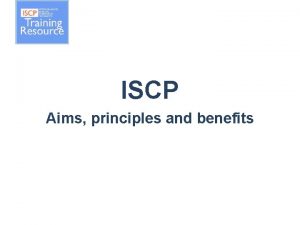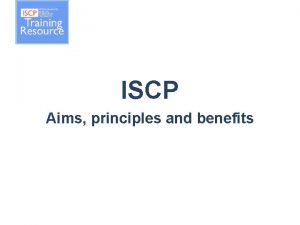Introduction to ISCP Miss Alexis Sudlow ST 3









- Slides: 9

Introduction to ISCP Miss Alexis Sudlow, ST 3 General Surgery

ISCP overview • ARCP evaluation largely based on ISCP content and evaluations • Several trainees let themselves down at ARCP • ISCP forms the basis of your written feedback- essential component of reflective learning • Limited guidance available from supervisors

Getting Started


Getting Started • Create placement • Add your clinical/educational supervisor • Add learning agreement

Assigned Educational Supervisor (AES) • Responsible for the overall supervision of a trainee’s educational progress • Should be up to date with the curriculum and overall aims and objectives of the CST programme • Roles: 1. Ensure trainee has adequate day to day supervision 2. Ensure trainees are familiar with curriculum and assessment 3. Trainee evaluation/appraisal through the LA 4. Monitor progress with ISCP requirements/WBAs 5. Discuss progress, encourage trainees to discuss any deficiencies in training programme 6. Provide summative report for ARCP 7. Discuss any issues regarding the trainee’s progress with the PD

Clinical supervisor • Roles: 1. Complete assessments requested by the AES or trainees including validating assessments 2. Liaise with the AES regarding any concerns regarding performance or progress of a trainee 3. Keep the AES informed of any issues which may affect a trainee’s progression 4. Provide an end of placement report for the AES which will form part of the ARCP

Types of WBAs • Cex- observation of trainee in clinical encounter focusing on history, examination, professionalism, clinical judgement, communication, organisation/efficiency • CBD- looks at clinical decision making, application of medical knowledge in the context of a discussion regarding a case a trainee was directly involved with. Assessment should take the form of an in-depth discussion and analysis. • DOPS- used to assess technical, operative and professional skills at a basic level and is used in simpler situations than the PBA. • PBAs- assesses trainee’s technical, operative and professional skills. Looks at whether a trainee has reached a satisfactory level of competence.

WBA Tips • ASK! • Link to curriculum • Pre-fill • Make it a habit • Do them regularly • Consider them as a way to maximise learning
















